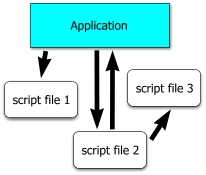Overview Documentation New in 1.4 Trial download
Index |
 you can easy call scripts from your application, call application from scripts or call scripts from scripts |
Insert this line somewhere in your program's start-up:
| xFuncs():install([filepath][,par1..parN]) |
filepath
- path of your scripts location. By default, this is a current path where
::install() was called. This value stored in xFuncs():rootPath.
par1..parN - parameters for script function start().
You can create script file (start.prg) with
declared start() (or Main()) function and this script
will be automatically called after initialization of XFuncs.
How to declare external function (xFunc)
There is three common ways to declare external function.
- First
scenario: required function is never called directly from program, only
by macro.
(For example, if macro stored in database and runs depends of situation)In that scenario no need to declare.
- Second scenario: required function is called directly from program and ULINK is not used.
You can declare function somewhere in your program by XFUNC <funcname>[(pars..)] command:
#include "xfuncs.ch"
XFUNC myUdf
XFUNC myUdf2()
XFUNC myUdf3(p1,p2)
- Third scenario: required function is called directly from program and ULINK is used.
ULink is replacement of ALink. It automatically create call-bodies of external functions. more>
In that scenario no need to declare.
Filename extention of script files
By default, extention of script files is ".prg". To change this value for example to ".udf" do:
| xFuncs():fileExt:=".udf" |
To run script
function just define call to it. This call all the same as call to function
linked in program. All other work, to find script file, compile and run
it, XFuncs do in background, without any additional code.
For example, if you define script function MyUdfFunc in file
MyUdfFunc.prg, just type:
MyUdfFunc() |
Note: function
Main() have special meaning. more>
To manual compile and run, call:
| xFuncs():run(funcName,par1,..parN)-> retVal |
funcName
- name of function
par1..parN - parameters of function
retVal - return value of called function
Another call with parameters stored in array:
| xFuncs():runA(funcName,parA)-> retVal |
funcName
- name of function
parA- array of parameters
retVal - return value of called function
NOTE: If program have build-in functions with same names as functions
in script, that build-in functions automatic replaces to script functions.
Next calls to that functions always run script functions.
How to replace function from exe to function from script
Sometimes
may be very useful to replace function builded in exe to function from
script.
This is possible with two ways: make build-in function invisible, or overload
this function with manual (or automatic) load script command.
- There
is a command to make build-in function invisible:
xFuncs():undefineFunc(funcName)
Next call to funcName will be call to script function with same name.
- To manual
load script into memory, just do:
xFuncs():load(funcName|scriptFilename)
Meaning of MAIN() function in script file
Function
Main() was special meaning in script file. When you try to call
function with name coincided with script filename and this function do
not defined in script and Main() is defined, Main()
will be called. In other words, you can call Main() function
by call to function with name of script file.
For example, if MyUdf.prg do not contains MyUdf(), but
contains Main(), if you call MyUdf(), Main()
will be called.
This
section explains how XFuncs search script (.prg) file
By
name of called function, in directory and subdirectories defined in
xFuncs():rootPath.
For
example, if you call function named MyUdfFunc, file MyUdfFunc.prg
is searched in directory and all subdirectories of ::rootPath.
NOTE:
Subdirectories will be checked in alphabetical order.
How XFuncs search include (.ch) file
XFuncs search an include file in next order:
- path of source file where include happens.
- ::rootPath+"INCLUDE\"
- ::rootPath+"CH\"
- ::rootPath
- and contents of SET INCLUDE=
Full list of vars and methods
in xFuncs() object
xFuncs() is an object to manage xFuncs engine.
::install(path)
Initializes xFuncs and setup origin path of script files (::rootPath).
Root path of script files.
::fileExt
Variable contains default filename extention of scripts. By default this is ".prg".
::run(funcname[,par1..parN]) -> result of run
::runA(funcname[,parA]) -> result of runManual run of script function.
::load(funcname|scriptname)
Manual load script in memory. Also, all build-in functions with same name as in script file will be overloaded.
Variable to define editor. If editor an external program, just define filename to ::editor. For use your own editor, define codeblock (first par is filename to edit). Default value is "notepad.exe".
::edit(funcname|scriptname)
Edit script.
::getFilename(funcname) -> script filename
Return name of script file contains defined function.
::undefineFunc(funcname)
Undefines (disables) any function stored in .exe or .dll. Next call to this function will run script function or raise "Function is not declared" error.
::redefineFunc(funcnameFrom,funcnameTo)
Redefines (replaces) one function to another. Next call to funcnameFrom will run funcnameTo.
::restoreFunc(funcname)
Restore state of funcname function if it was undefined or redefined before.
What is ULink?
ULink
is replacement of ALink. Unlike Clipper, Alaska do not allow calls to
undeclared function. There is special option for ALink (/force:unresolved)
to create exe-file even if function is not declared, but when program
calls this undeclared function, application crashes. In Clipper just "Function
is not declared" error raised. Main goal of Ulink is do same thing
in Alaska Xbase++. ULink runs ALink, then analyze output file and if undeclared
functions is found, creates file unres.prg, compile it, add it
to link script and finally rerun ALink.
How
to install ULink?
The installation of ULink is very simple. Look into your .xpj file (usually
project.xpj) and replace:
| [PROJECT] |
to:
| [PROJECT] |
- The = assignment do not work yet. For assignment always use := instead of =.
In preprocessor:
- Nested optional clause [] do not supported.
- Repeating replacement clause do not supported.
In runtime:
- <threadObject>:start("funcname") may do not work if funcname placed in script. Please, declare this function by XFUNC <funcname> command or use codeblock instead.
Please
note, this problems will be fixed in nearest versions of XFuncs.
©2006 Eleus Software
